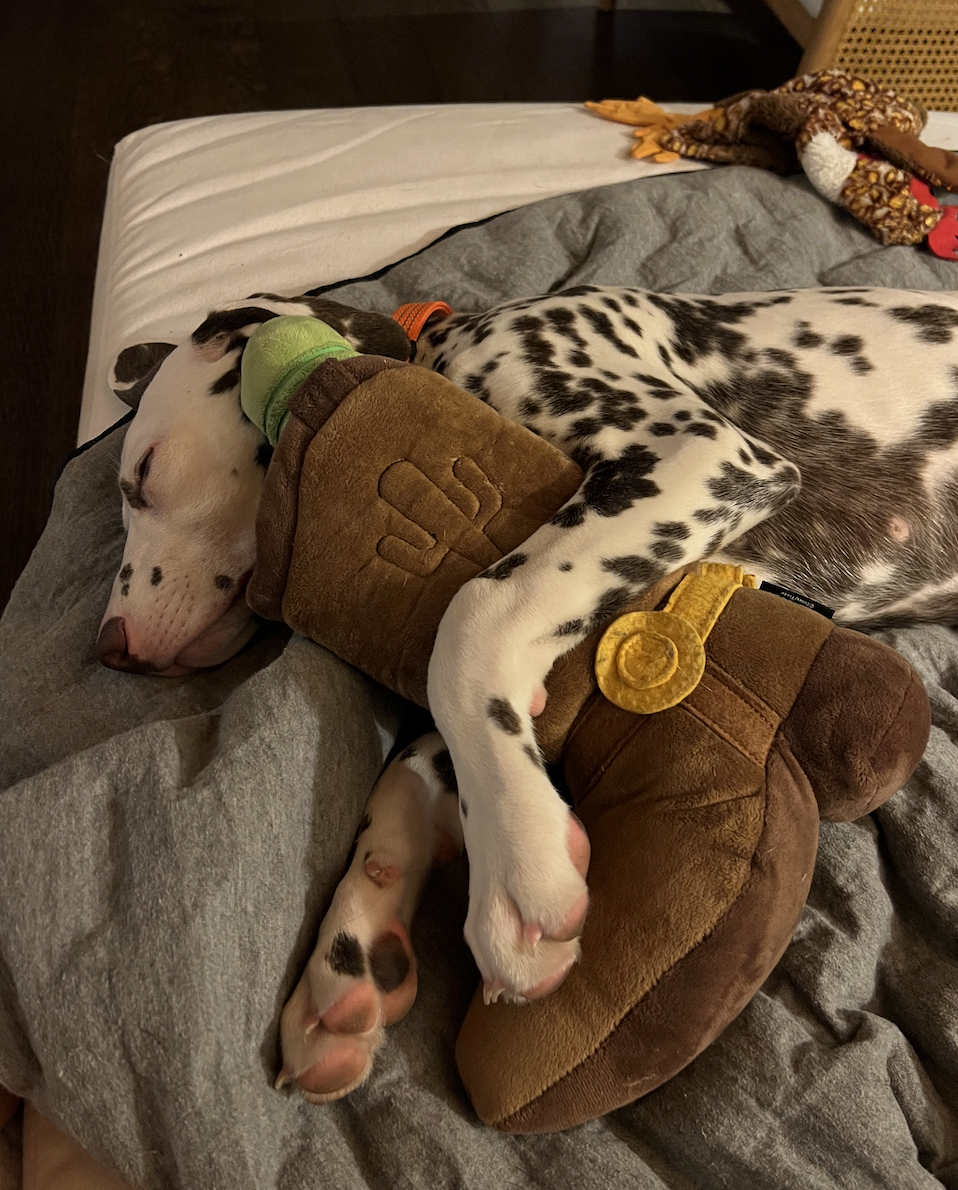How Much Sleep Does My Puppy Actually Need?
In addition to their daily nutritional intake, did you know one of the most impactful ways to keep your puppy happy, healthy, and meeting pivotal developmental milestones is by simply letting them catch zzz’s?
Like babies, puppies require a ton of hands-on time and attention (think: training, potty training, feeding, bathing, vet visits, as well as mental and physical stimulation through things like play and exercise) — they also necessitate sleep. A lot of it.
Fact: Little puppies are only awake 4-6 hours during the day! According to the AKC, puppies aged 7-8 weeks should get 18-20 hours of sleep per night! As they grow, the number of hours of sleep required reduces to about 13-15 hours.
Why does my puppy need so much sleep? During this critical life stage they are developing rapidly (think: everything from cognitive development to intense muscle, cartilage, and bone growth.)
Another important reason to respect their sleepy time is to help reinforce their training. Sleep acts as their brain’s save button. So quality sleep helps them to retain and recall early learned behaviors and cues. Sleep also gives your puppy a chance to recover and process their day.
Short-term Takeaway: Don’t interrupt their slumber.
Long-term Takeaway: To optimize your puppy’s quality of sleep, stick to a sleep schedule.
NIGHTTIME
Q: When’s my puppy’s ideal bedtime?
A: You want to tuck your puppy in one hour after dinner and their nighttime potty break. Reinforce your puppy’s bedtime ritual during a block in the evening when you have ample time to spend with them. (Fringe Benefit: Practicing a regular nighttime routine with your puppy will also encourage you to do the same type of unplugging and unwinding — which makes for improved quality of sleep for everyone.)
Q: My puppy has a hard time settling down for the night. What can I do to help them chill out?
A: Burn off some of that puppy energy! No super technical advice here, just exercise them with a walk or play with their favorite toy. (And make sure that their crate or bed is a safe haven of comfort and quiet.)
Q: My puppy won’t sleep through the night. What can I do to help?
A: A young puppy may have a difficult time sleeping through the night — at first. Here’s why…
Reminder: Your puppy is going through a period of great transition. They’ve left their home of origin, and are used to sleeping in a pack with their mom and littermates. Initially, they may feel isolated, scared, and overwhelmed or even distracted by their new surroundings (think: new sights, new smells, new humans — the list goes on and on).
NOTE: Puppies’ bladders are very small — they cannot “hold it” (will not have control over their bladder) until they’re approximately five-months old. If they wake up at night, this typically means your puppy needs to pee. Do not play with them at this time, simply take them out for a late-night potty break and put them back to bed — ideally in their crate.
Like any new parent, for the first couple of weeks, just accept that you may experience several nights of interrupted sleep. As your puppy learns and develops, things will get better and easier with time!
Q: I want to snuggle with my puppy. Can they sleep in bed with me or my kids?
A: Get your puppy snuggles during the day. It’s best to take advantage of crate training while they’re little, and wait to have them snuggle you at night once they’re totally potty-trained and acclimated to their new surroundings.
DAYTIME
Once you’ve determined how much sleep your puppy typically gets during the night, make up the difference during the day to ensure they get the hours of sleep they require. Reminder: Puppies aged 7-8 weeks should get 18-20 hours of sleep per day which overtime will reduce to about 13-15 hours.
Like humans, puppies are influenced by sunlight. They tend to rise with the sun, and get sleepy when it sets. If you don’t want an early wakeup call from your puppy, try covering their crate or have them sleep somewhere where light doesn’t seep in too brightly.


